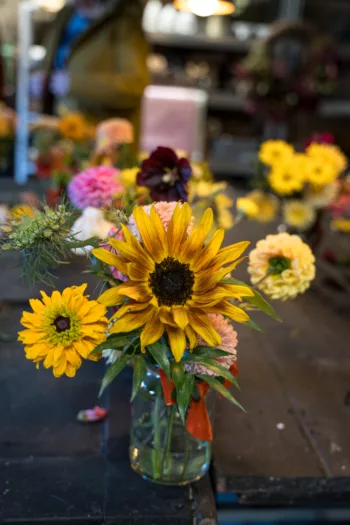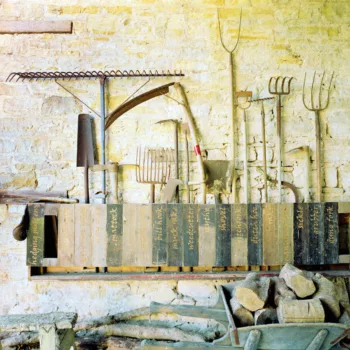Margaret, Steve’s partner of 60 years, explains how a humanist celebrant helped her remember and celebrate Steve’s life with his friends and family on the farm that he loved, as well as helping her come to terms with her own grief.
“I hate that word, ‘funeral’,” Margaret says. “I don’t like the atmosphere you can get in the crematorium, where it feels like such a sombre, sad occasion, everyone in black, and you’re wondering, ‘Will my stomach rumble, will I cough, will I sneeze?’ As my son Jim says, we’re used to seeing death on the farm – it’s upsetting and you never forget someone, but it’s natural.”
Like Margaret, Steve was also opposed to the idea of a traditional, formal funeral, so he requested a direct cremation – with his ashes scattered on his farm where he spent so much of his time.
‘He was always outside’
“Whenever it was light, he was always outside on the farm,” remembers Margaret. “He was always farming, but he enjoyed himself even more with his hobbies and tinkering in his workshop, always making something.
“If we ever thought, ‘Where is he?’, he’d be in his workshop. Even once he was in a care home, he’d be undoing the screws in his wheelchair or trying to fix someone else’s table. If he saw a nut or a bolt, it had to be undone.”
After the direct cremation, Margaret and Jim decided they wanted to find a way to celebrate Steve’s life, out on the farm, so Margaret turned to the humanist website to find a celebrant to help them. They found Rachel.
‘I took to her straight away’
“When I saw she’d worked for the NHS as well as being a celebrant, I thought she must be understanding and dedicated,” explains Margaret. “We spoke on the phone and then arranged to meet at the farm. I took to her straight away. It’s uncanny how you just know when something’s right.
“I said to her, ‘I want it on the farm, there’s no other place for it’. She agreed. When she had a look at the barn, she said it was perfect.”
Humanist celebrant Rachel picks up the story: “In the barn where Steve and his family spent many hours preparing vegetables to send to suppliers, there were motorbikes and tractors, now ridden and driven by his granddaughters, and so many nooks and crannies.
“The most poignant thing for me was Steve’s workbench, still surrounded by tools he has used himself and probably used by people before him.
“At the ceremony, we played music he loved, and covered a table in photos, articles written about him, and funny poetry he and his postman had exchanged over the years.
“People made informal contributions – less inhibited than they might have been in a more formal setting. There were family, friends from near and far, and local people who had known him for decades.”
‘It gave me something to think about’
As well as the joy of the day itself, Margaret is sure that planning the celebration of life helped her to get through the weeks after Steve’s death.
“There were several weeks after he died when all I wanted to do was die with him,” she says. “So I went to the doctors and said I didn’t feel right, and they organised a counsellor for me.
“I found that getting everything organised for Rachel, and for the celebration of life, focused my mind, it gave me something else to do. I wrote a lot of it, and chose the music, but Rachel put it together. When I got to bed at night, I’d fall asleep instead of staying awake thinking about other things.
“When it was over, I took a copy of the script from the ceremony to show my counsellor. I knew I felt so much better by that point, and she said to me later, ‘That was when you really started to pick up.’ But I think if we’d had a service in the crematorium, I would have felt more depressed afterwards.
“The nicest thing about what we did was that it was so uplifting and so relaxed. It almost felt like a party. People kept saying how much they enjoyed it, and you don’t often hear that after a funeral!”

Humanist memorial ceremonies can take place anywhere and are all unique and personal, Humanist Ceremonies funeral celebrants are all highly trained and accredited by Humanists UK to lead meaningful celebration of life ceremonies.
Thank you to Steve’s family for sharing the story of his memorial ceremony with us. The humanist celebrant for Steve’s ash scattering ceremony was Rachel Narkiewicz, a highly trained funeral celebrant based in Norfolk, you can find out more about Rachel here.
Arranging a memorial
While a funeral director is the professional most likely to deal with the practical arrangements of a funeral, the type of ceremony you choose is entirely up to you. Our celebrants are sensitive people, empathetic to the experience of bereavement, and focused on providing a non-religious memorial ceremony that will be most fitting for the circumstances.
They are familiar with cremation and ash scattering procedures and will guide you through the whole process of arranging a funeral ceremony and will have ideas and suggestions about how to make it totally personal for your loved one.






